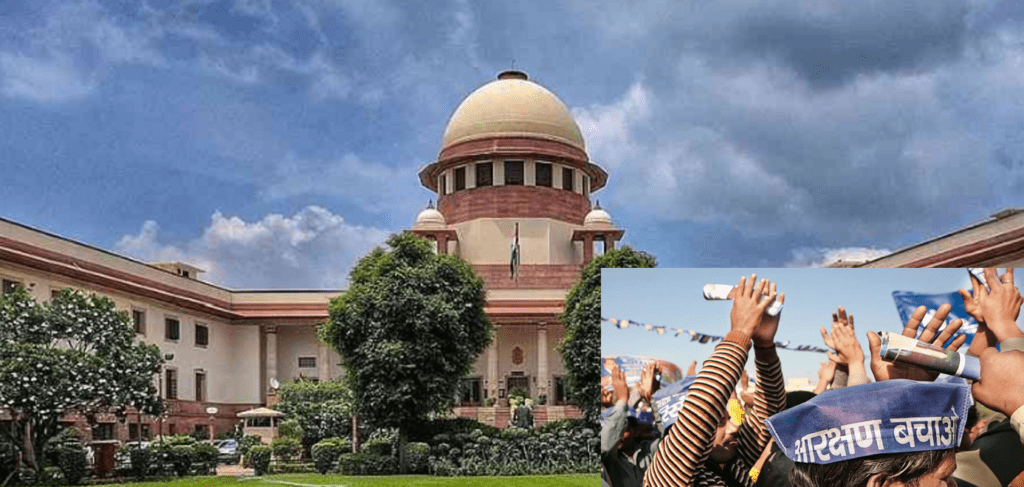
The state government also announced two new categories of reservations and divided the 4 percent Muslim quota between the Vokkaliga and Lingayat, the two numerically dominant and politically influential communities in the state.
The Supreme Court on Thursday expressed concern over the Karnataka state government’s decision to increase quotas for vokkaligas and lingayat in government offices and educational institutions by 2% each, while removing the 4% reserve for Muslim OBC.
A bench of justice KM Joseph and BV Nagarathna said court filings show the Karnataka government’s decision was based on a “completely false premise”.
Senior advocate, Kapil Sibal, Dushyant Dave and Gopal Sankarnarayanan, said on behalf of members of the Muslim community in Karnataka that no research had been conducted and no empirical data was available from the government to increase the quota for Muslims.
Attorney Tushar Mehta, appearing in Karnataka, asked for time to respond to the petitions and assured the jury that nothing irreversible would happen until Tuesday and meanwhile no nominations or admissions based on the contested GO of March 24 the applicants would take place.
During the trial, the jury told Mehta, “Based on the documents and evidence presented to us, it appears that the Muslims were backward, and then things suddenly changed based on incorrect assumptions.” Judge Joseph said to Mehta, who after Time sought to file responses to the motions: “All we are saying is that the order you have given appears, at first glance, to imply that your base
decision is on very shaky and imperfect ground”. Judge Nagarathna questioned the urgency with which the government issued the order, saying it was based on an interim report and the state could await the final report. Mehta said: “Nowhere can a quota be assigned on the basis of religion and if it has been assigned it is a mistake.It is not that the entire Muslim community has been denied participation in Karnataka. They have a 10% limit in the Economically Weakest Section (EWS) category. There are other Muslim communities like Pinjara, Mansoori, etc. that fall under the OBC category and still get quotas.” He said it would be unfair if the court issued an injunction without allowing the state government to respond.
“We will not issue an injunction if the court receives assurances that no action will be taken against the contested government order,” Judge Joseph said, adding that there is a provision for accepting an interim report and awarding a sum.
Mehta stated that there were no barriers and that the right to complain included the right to an interim report and was asked to say that no empirical data was available or that no research had been carried out to establish that the Muslim community to be able to be a reserve religion.
“The petitioners referred to Judge O Chinnappa Reddy’s report of the Commission on the Backward Classes which does not state that Muslims are backward. I will give some more accounts of this fact. Muslims who are OBC are already getting a reservation,” he said.
By way of introduction, Dave, speaking on behalf of petitioner L Ghulam Rasool, said that two days before national elections were scheduled, the government abolished the 4 percent quota for Muslims and allocated it to the Vokkaligas and Lingayats, which was completely “unconstitutional and arbitrary”. “I’m shocked how the government can do this without empirical data or extensive research. It’s against the
series of judgments by this court. It’s against the state statute of 1995,” he said.Dave said that based on data and empirical material, it was concluded that Muslims are a backward community in the state and deserve reservations. “I have the right not to be generous. This would be understandable if there were studies or empirical data. But there is none. Their own regular report states that Muslims should be entitled to an escort.Where was the need to touch that (amount)? This court has said that the reservations cannot be based on political reasons,” he said, adding that Vokkaligas and Lingayats have already benefited from the reservations.
Justice Nagarathna asked Dave what would be the impact on the Muslim community of this government order. “I will lose access to government jobs and admissions to educational institutions. Minorities need to be protected by this court,” Dave responded. Sankaranarayanan, also appearing for the petitioners, said they have put the Muslims under EWS quota, which is a family unit based quota depending on individual family earning and not community-based reservation. Sibal, also appearing for the petitioners said, “Since 1994, I was entitled for quota but now in 2023, I am not entitled. I am put in a general category that too without any study. This is violative of Article 14 and the worse is that they now say what was granted for 30 years was wrong.” Senior advocate Mukul Rohatgi, appearing for members of the Vokkaliga and Lingayat communities, said no interim order should be passed without allowing them to place their response to the petitions.
“This is a case of grant of the quota to someone else . All I’m saying is give us some time to respond to the petitions. They had shown nothing to justify the court’s approval of the interim measures. It’s about 4-5 days. It would be unfair to issue a restraining order and my share will be used as well,” he said.Judge Joseph said the government does not appear to agree with the residues committee’s report. “This Court has found in two sentences of the Constitutional Court, composed of five and seven judges, that religion cannot be the basis of the reserve”; he said, emphasizing that some higher courts have also expressed similar sentiments.
The state’s BJP government headed by Basavaraj Bommai decided to scrap the four per cent reservation for Muslims in government jobs and educational institutions weeks ahead of the state assembly polls on May 10.
The state government announced two new reservation categories and split the 4% Muslim share between Vokkaligas and Lingayats, two numerically dominant and politically influential communities. Quota Muslims were divided into economically weaker categories.
The state government’s decision has pushed the reservation limit to around 57 per cent now.
Written by -Anushka yadav student of the ba.llb 2nd semester at Rnb global University bikaner Rajasthan





0 Comments